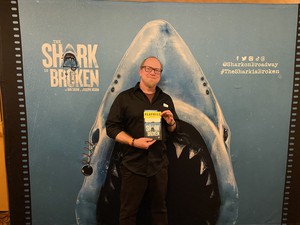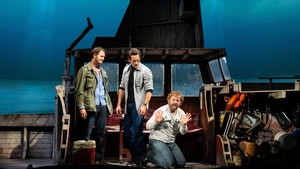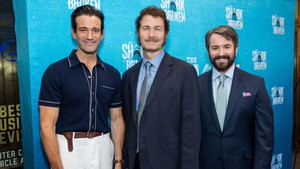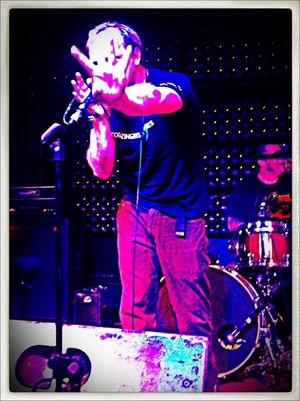I had the pleasure of visiting the John Golden Theater this past Friday at 7pm to see a performance of Ian Shaw and Joseph Nixon’s “The Shark is Broken,” a 95-minute one-act comedy play. The play tells the story of the tense shooting schedule aboard the ‘Orca’ during production of Stephen Spielberg’s classic 1975 monster movie JAWS. Its characters are the movie’s stars: Robert Shaw, portrayed by his son and co-writer Ian Shaw, Richard Dreyfuss played by Alex Brightman, and Roy Scheider as embodied by Colin Donnell.
As we find our seats we see a cutout of the famous lobster boat 'The Orca' onstage, a projection of the ocean and horizon behind it, birds circling listlessly in the distance above stage right, waves lapping along the expanse of the front of the stage. The John Golden Theater is beautiful if understated, and my friend and I arrived with no time at all to grab refreshments before the chimes sound to tell us the play is about to begin. (Which is fine - we’d filled up on dumplings and were looking forward to a nice, long sit.)

As the players made their way to stage one by one, the audience applauded their arrival, pausing the action on the stage. It had been so long since I’d seen a live production that several times I found my eyes adjusting to the reality before me. Each actor is so surefooted in his role that I often forgot that they were flesh only fifteen feet away. The live space is always mercurial, and to know that any outburst or bodily function could derail the entire production is part of what makes theater so enthralling.
On the projection past the boat we see the telltale shark fin, and John Williams’s famous two-note score fills the room. As the tempo rises and the intensity swells, the tail comes to a halt offstage, and we hear the protest of hissing pneumatics and the smoke of failure wafting through the screen. The Shark, dear friends, is Broken.
So begins the crucible of these three actors, who bemoan their lot and their director’s mad vision of filming his burgeoning blockbuster on the open ocean. As “Bruce” continues to need to receive ceaseless TLC to coax his performance, the trio try to fill their downtime with something resembling male bonding. As is often the case when relative strangers are forced into prolonged intimacy, rifts develop between the men - notably between Shaw and Dreyfuss. The former is terminally serious, yet frequently drunk, while the latter is flippantly breezy and frequently high. Their oil and water routine shakes out, literally, in the bobbing cabin of The Orca as Scheider acts as something of a mediator between the two hotheads.
The set and costume design by Duncan Henderson transports the audience back to that hectic film shoot in 1974. From screen to stage, the accuracy of every aspect of the design is meticulous, such that the illusion is never shattered. Directed by Guy Masterson, each of these actors playing actors are delivering performances so nuanced and informed, I believe, could easily become hacky mockery in the hands of lesser thespians. Ian Shaw playing his own father as a thoroughly damaged yet inspired professional is both cathartic and warm - we see him grappling with the warts-and-all legacy of the Academy Award-nominated actor whom he saw more intimately than any of us were ever given chance. As he is co-writer of the play, with his friend Joseph Nixon, it only stands to reason that his performance seems the most informed.

Alex Brightman, I’m told, is a mutant. He’s admitted as much in an interview - something to do with his freakishly capable vocal cords. This has allowed him to voice the gruff and decaying Beetlejuice 8 times a week while he popularized the role on Broadway and is perhaps key to his Dreyfuss intonation in ‘The Shark is Broken.’ One realizes watching Brightman’s run as Dreyfuss how similar the younger version of Mr. Holland is to Zach Galifianakis. I have no commentary on this past that realization.
The performance that I found truly spectacular and wholly transformative was that of Colin Donnell’s as Roy Scheider. The physicality, the voice, the glasses - it all works to completely mask Donnell into Scheider, to the point that it wasn’t until much later in the evening, as I was poring over the playbill at a piano bar that I realized I’d seen the actor’s work before. Donnell played Tommy Merlyn throughout the run of the CW’s ARROW - one of the truly standout characters and performances in that show as he was one of the only characters that seemed to have any affability or realism. While many of the show’s regulars seemed either stiff or cartoonish, any scene with Tommy Merlyn had a warm authenticity that was lacking elsewhere in the show. (Not to say that ARROW wasn’t great because it was, but we can be honest about its shortcomings at this point.) While Donnell’s character spends most of the play talking his co-stars off of their prospective ledges and keeping the coolest of heads, it hammers the grueling stress of the shoot home all the more poignantly in a scene towards the middle of the show when even the composed Scheider loses his cool. Taking the opportunity of a break in shooting to catch some rays on the deck, as he was apocryphally apt to do, Scheider is called back into production at a breakneck speed. And break, he does. His meltdown brought further silence to an already silent and rapt crowd, and the way the play seamlessly goes directly from that scene to another day at the office is another display of its brilliance peeking behind the curtain.
To the meat of the script, the play takes many liberties with the multitude of decades between its source material and its place in our time. The principals question the methods, question themselves, question the market - but they never question Steven. Even when they admit he might be a madman, and cast doubt on the quality of the film, they never sway in their devotion to Steven’s direction. This particular nuance may be due to the benefit of hindsight, but I think it’s a message worth keeping. While the players bemoan the perpetually broken shark, they still stand by the vision of the director. The script takes many opportunities to compare and contrast the nature of film, art, self-perception, professionalism, and politics of a world fifty years removed from ours but the tunes sung often sound the same - men are flimsy, vain creatures that unravel at rest. Much as we saw the best of us unwound by the pandemic, these men who would be the avatars for the Summer Blockbuster find themselves undone in their repose. Who is an actor if he is not acting? That is the ultimate question that ‘The Shark is Broken’ attempts to answer.
That answer, ushered in with a two-note refrain, is ‘A Monster.’

‘The Shark is Broken’ is playing at the John Golden Theater in New York City until November 19th.
Until next time, keep your head above water.
-Eric McClanahan, aka McEric-
